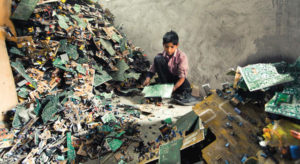India becoming world’s dumping ground for E-waste
A lack of regulation and increasing ”˜throw away’ culture in India has led to the country becoming the world’s biggest dumping ground for discarded electronic goods, a conference at The Australian National University (ANU) will hear.
Co-convener of the world-making and the environment in the Asia-Pacific region conference, Dr Assa Doron of the ANU School of Culture, History and Language, will highlight the issue at the event which aims to explore the relationship between global issues and local solutions.
“India has become the dumping ground for our e-waste,” Dr Doron said. “Everything from computers, phones, televisions and whitegoods are illegally being exported to India.”
“The country has also become a huge consumer hub itself where a lot of the electronic goods are being disposed of as India adopts a ”˜throw away’ society.
“In the West we like to throw things away and forget about them. We engage in these pious everyday rituals of recycling, but these electronic goods are ending up in third-world countries.”
According to the 2015 United Nations Environment Programme up to 90 per cent of the world’s electronic waste is illegally dumped in India; this is on top of the estimated 1.8 million mertic tonnes of e-waste produced domestically each year.
Respected scholar and conference co-convener Professor Dipesh Chakrabarty said e-waste was just one global crisis arising as we move into a new geological age called the Anthropocene, where human activity is the biggest influence on climate and environment.
He said the conference would play a key role in exploring how global issues must be dealt with at local levels to have any impact in South Asia.
“If you try to convince us as a species you will fail, we do not operate as a species,” Professor Chakrabarty said.
“That’s why it is very important for the global problems to be translated into issues that make sense locally.
“For instance in a coal mining area of Australia, people might not be that concerned with climate change. But they might be concerned about pollution. You have to make that connection.
“India and China are the two nations, because of their sheer size, that will decide the future of the planet. If they don’t give up on coal and fossil fuels, we’re all done for.”
Professor Chakrabarty is the Deans’ Distinguished Visitor in the School of Culture, History and Language, away from his permanent position at the University of Chicago.
The World-making and the environment in the Asia-Pacific region conference is being hosted by the ANU School of Culture, History and Language and will run for two days from tomorrow. For more information and a full program, visit: http://chl.anu.edu.au/news-events/events/721/world-making-and-environment-asia-pacific-region
Short URL: https://indiandownunder.com.au/?p=7283

